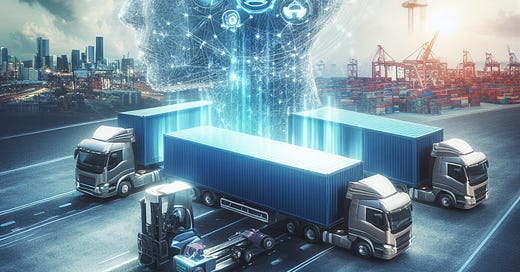The AI Revolution in Supply Chain Management
Navigating the Future of Logistics with Artificial Intelligence
Hello D2C Geeks!
In the rapidly evolving landscape of digital commerce, optimizing supply chain management is the linchpin to success. Today, we're delving into the realm of Artificial Intelligence (AI) and its transformative role in streamlining logistics and fulfillment processes.
Food For Thought: AI in Supply Chain Management
The supply chain is the backbone of any e-commerce business, and AI is emerging as a game-changer. Traditional supply chain models often grapple with challenges like forecasting errors, delays, and inefficiencies. AI, with its advanced algorithms, analyzes vast datasets in real-time, offering unprecedented insights into every facet of the supply chain.
AI works by forecasting demand more accurately, considering variables like historical data, market trends, and even external factors such as weather patterns. This enables businesses to maintain optimal inventory levels, reducing the risk of stockouts and excess inventory costs.
Moreover, AI enhances logistics by optimizing routes, predicting delivery times, and automating repetitive tasks. It introduces a level of agility and responsiveness that traditional supply chains find hard to match.
Optimizing Routes:
AI-driven algorithms analyze historical and real-time data to identify the most efficient routes for shipments. This not only saves time but also minimizes fuel consumption and reduces the environmental impact. By considering factors like traffic patterns, weather conditions, and road closures, AI ensures that your goods reach their destination in the most streamlined manner.
Predicting Delivery Times:
One of the key advantages of AI is its ability to predict delivery times with remarkable accuracy. By factoring in historical delivery data, traffic conditions, and even potential disruptions, AI algorithms provide real-time estimates. This not only enhances customer satisfaction but also allows for better coordination of resources, ensuring that your logistics operations run like a well-oiled machine.
Automating Repetitive Tasks:
In the realm of supply chain management, many tasks are routine and repetitive. AI excels in automating these processes, from data entry to order processing. This not only reduces the likelihood of human error but also frees up human resources for more strategic and complex decision-making. Automation ensures that the supply chain operates smoothly, with minimal bottlenecks and delays.
Weekly Hack: Practical Tips for AI-Enhanced Supply Chain Management
Implement Predictive Analytics: Integrate AI-driven predictive analytics tools to anticipate shifts in demand, allowing proactive adjustments in your supply chain.
Leverage Automation: Explore automation technologies that work hand in hand with AI, streamlining routine tasks and ensuring a more efficient and error-free supply chain.
Real-Time Tracking: Utilize AI-powered tracking systems to monitor your shipments in real-time. This not only enhances visibility but also allows for immediate responses to any disruptions.
Collaborate Across Platforms: Integrate AI technologies with other platforms, such as your ERP system, for a seamless flow of data. This interconnectedness enhances the overall efficiency of your supply chain.
As we stand at the intersection of technology and commerce, AI is proving to be the driving force behind a revolution in supply chain management. The benefits— precision in forecasting, cost savings, and operational efficiency — are reshaping the logistics landscape.
Happy optimizing!
Synthia




